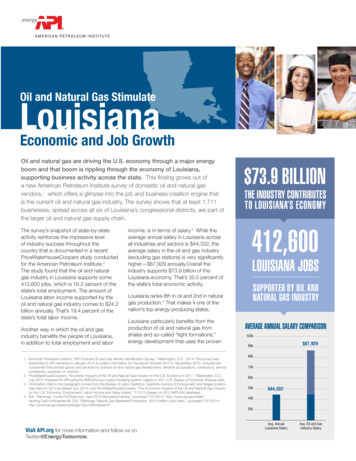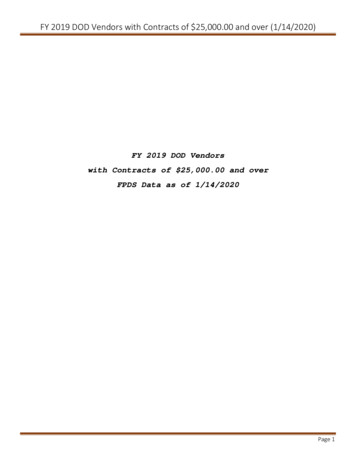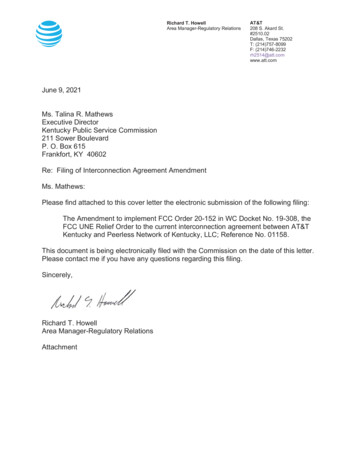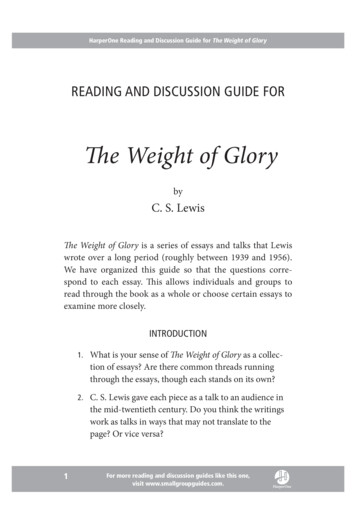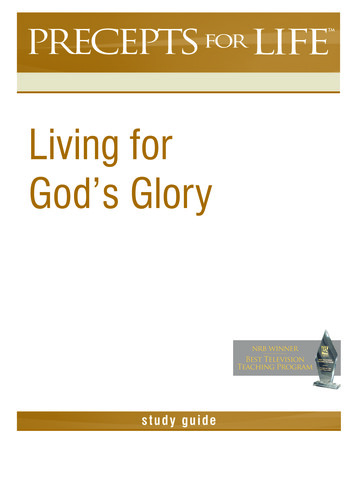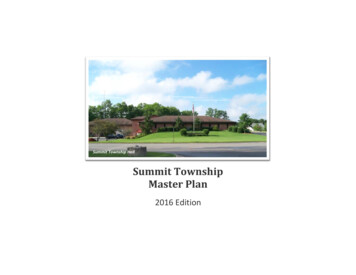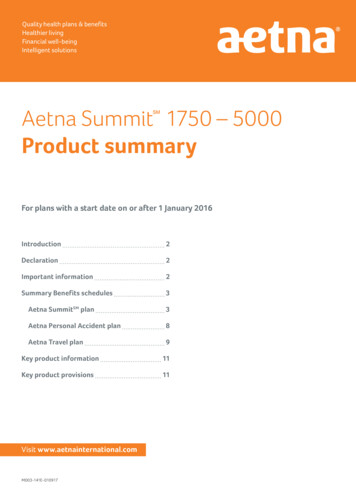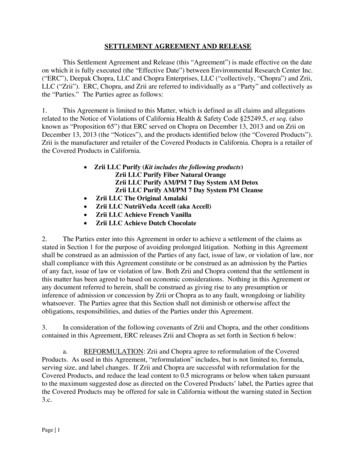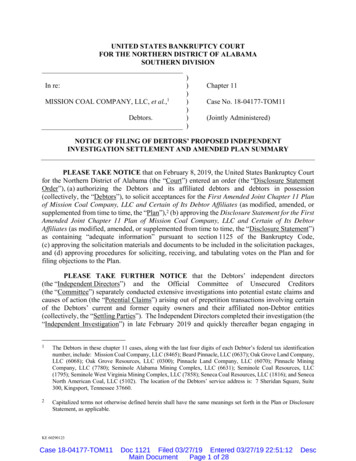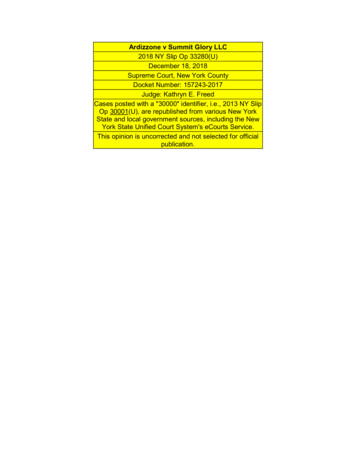
Transcription
Ardizzone v Summit Glory LLC2018 NY Slip Op 33280(U)December 18, 2018Supreme Court, New York CountyDocket Number: 157243-2017Judge: Kathryn E. FreedCases posted with a "30000" identifier, i.e., 2013 NY SlipOp 30001(U), are republished from various New YorkState and local government sources, including the NewYork State Unified Court System's eCourts Service.This opinion is uncorrected and not selected for officialpublication.
[* 1]INDEX NO. 157243/2017NYSCEF DOC. NO. 157RECEIVED NYSCEF: 12/18/2018SUPREME COURT OF THE STATE OF NEW YORKNEW YORK COUNTY: PART -----------------------------xANGELO ARDIZZONE.and MARYBETH ARDIZZONE,DECISION AND ORDERPlaintiffs,Index No.: 157243-2017- againstSUMMIT GLORY LLC, FOSUN INTERNATIONALLIMITED d/b/a FOSUN PROPERTY HOLDINGS, HUNTERROBERTS CONSTRUCTION GROUP, LLC, AMERICONCONSTRUCTION INC., MILROSE CONSULT ANTS, INC.,GENSLER ARCHITECTURE DESIGN & PLANNING P.C.,INTERIOR ARCHITECTS INC., INTERIOR ARCHITECTSP.C., SHMERYKOWSKY CONSULTING ENGINEERS,SYSKA HENNESSY GROUP, INC., DNA CONTROLLEDINSPECTION LTD.,Mot. Seqs. 002 & ------------------------------------------xHON. KATHRYN E. FREED, J.S.C.:Motion sequence numbers 002 and 004 are consolidated for disposition. The followinge-filcd documents, listed by NYSCEF document number, have been reviewed by the court: 48,49, 50, 51, 52, 53, 73, 74, 75, 90, 101, 129, 130, 131, 132, 133, 134, 135, 136 (Motion sequence002); 81, 82, 83, 84, 85, 86, 87, 88, 100, 102, 103, 104, 112, 113, 114, 115, 116, 117, 118, 119,137, 138 (Motion sequence 004).In this action, plaintiff Angelo Ardizzone alleges that he suffered personal injuries whileworking at a construction site. 1 In motion sequence 002, defendant Shmerykowsky ConsultingEngineers (Shmerykowsky), moves, pursuant to CPLR 3212, for an order granting summaryjudgment dismissing plaintiffs' complaint and all cross claims as against it. Shmerykowsky alsomoves, pursuant to 22 NYCRR 130-1.1 (a), for costs.1Plaintiffs wife, plaintiff Marybeth Ardizzone, asserts a derivative claim for loss ofconsortium.2 of 10
[* 2]INDEX NO. 157243/2017NYSCEF DOC. NO. 157RECEIVED NYSCEF: 12/18/2018In motion sequence 004, defendant Syska Hennessy Group, Inc. (Syska), moves, pursuantto CPLR 3212, for an order granting summary judgment, dismissing plaintiffs' complaint and allcross claims.FACTUAL AND PROCEDURAL BACKGROUNDPlaintiff alleges that he suffered personal injuries on June 9, 2016, when he fell from aladder during the course of his employment at a construction site on the 30th floor of a buildinglocated at 28 Liberty Street, New York, New York. At the time of his accident, plaintiff was anemployee of All ran Electric of New York, LLC., which is a non-party to this action.Plaintiff filed a complaint on August 11, 2017, alleging common law negligence andviolations of New York's Labor Law§§ 200, 240 (1), and 241 (6) as against defendants HunterRoberts; Summit Glory, LLC ("Summit"); Fosun International Limited d/b/a Fosun PropertyHoldings; Americon Construction Inc. ("Americon"); Milrose Consultants, Inc.; GenslerArchitecture Design & Planning P.C.; Interior Architects Inc.; Interior Architects, P.C.;Shmerykowsky; Syska; and DNA Controlled Inspection Ltd.ARGUMENTSMotion Sequence 002In motion sequence 002, Shmerykowsky seeks an order, pursuant to CPLR 3212,granting summary dismissing the complaint and all cross-claims as against it.Shmerykowsky contends that its responsibilities at the site were limited to designing structuralsupport for a "Skyfold" folding partition for an office build-out to be supported from the 31st23 of 10
[* 3]INDEX NO. 157243/2017NYSCEF DOC. NO. 157RECEIVED NYSCEF: 12/18/2018floor. Shmerykowsky argues that it was performing no work at the site when plaintiff fell, didnot own or lease the premises, did not contract or subcontract with any entity to performconstruction work at the premises, and did not control, operate, manage or maintain the premises.Shmerykowsky contends that it is not a proper defendant under New York's Labor Law becauseit did not exercise any supervisory control or direction over plaintiff or his employer.Shmerykowsky also argues that, since it was not working at the construction site on the day ofthe accident, it did not have any notice of the conditions which allegedly caused or createdplaintiffs injury.In an affidavit dated November 6, 2017, Shmerykowsky's principal, Marco J.Shmerykowsky, states that Jones Lan LaSalle entered into an agreement with Shmef):'kowsky forengineering services for the premises located at 28 Liberty Street. According to the affidavit,Shmerykowsky had finished its work pursuant to the agreement two months before plaintiff'saccident; it did not own or lease the premises or contract or subcontract with any entity toperform construction work at the premises; and it did not perform any physical labor at thepremises. The affidavit also states that Shmerykowsky did not control, operate, manage, ormaintain the premises; did not have control over the construction project or the direction of thework; and that it did not employ or supervise plaintiff, have control over his work, or havecontracts with his employer or any co-defendant on the date of the accident.Shmerykowsky argues that the cross claims for contractual indemnification, contribution,and common law indemnification must also be dismissed as there is no evidence thatShmerykowsky was negligent. Shmerykowsky also contends that it should be awarded costspursuant to 22 NYCCRR 130-1.1. Counsel for Shmerykowsky indicates that, on two occasions,34 of 10
[* 4]INDEX NO. 157243/2017NYSCEF DOC. NO. 157RECEIVED NYSCEF: 12/18/2018he requested that the action be discontinued as against Shmerykowsky.In opposition, plaintiffs contend that the motion is premature because discovery isincomplete. Plaintiffs maintain that bills of particulars have yet to be served, depositions havenot taken place, and no formal discovery has been exchanged. They contend that CPLR 3212 (f)permits a party that is opposing a motion for summary judgment to obtain discovery when itappears that facts surrounding the position of the opponent exist, but cannot be stated. Plaintiffsargue that they would need documentary evidence before discontinuing their action against anyparty. Plaintiffs also contend that, because the co-defendants are not stipulating to discontinueagainst Shmerykowsky, plaintiffs must presume that Shmerykowsky is not free from liability.Americon also opposes Shmerykowsky's motion and argues that the motion for summaryjudgment is premature because discovery is outstanding. Americon argues that the onlydocumentary evidence in support of Shmerykowsky's motion is the self-serving affidavit ofMarco J. Shmerykowsky, which merely reiterates the contentions set forth in the affirmation ofcounsel for Shmerykowsky.Americon argues that, while plaintiff alleges that he was caused to fall from a ladder dueto debris or construction materials, evidence involving any construction or engineering work atthe site prior to plaintiffs accident is relevant and should be disclosed through the discoveryprocess. Americon contends that plaintiffs have not served a bill of particulars, depositions havenot been conducted, and documentary discovery has just begun.Summit also opposes Shmerykowsky's motion and contends that the motion is premature.Summit contends that the project at which plaintiff alleges to have been injured did not involvework performed on behalf of Summit. Summit argues that, due to the lack of discovery, it should45 of 10
[* 5]INDEX NO. 157243/2017NYSCEF DOC. NO. 157RECEIVED NYSCEF: 12/18/2018not be expected to have sufficient documents or information which would enable it to provide ameaningful response to the motion. Summit maintains that the discovery process must becompleted before a summary judgment motion is entertained.Motion Seguence 004In motion sequence 004, Syska moves, pursuant to CPLR 3212, to dismiss the complaintand all cross claims as against it. Syska argues that plaintiffs' claim that it violated New York'sLabor Law must be dismissed because Syska was not responsible for performing or supervisingany of the work at the site. Syska contends that it neither owns nor controls the property wherethe alleged accident took place, that it was not a general contractor for the project, nor did itexercise supervisory control over plaintiffs work. Syska also contends that it was not workingon the 30th floor when plaintiff fell, it had no notice of the conditions, and that it did not create orcause the injury producing activity.In support of its motion, Syska submits an affidavit from Richard Drouin (Drouin),Project Manager from Syska. Drouin states that Jones Lang LaSalle Americas, Inc., and Syskaentered into an agreement for engineering services involving the premises at 28 Liberty Street onthe 30th floor. Drouin maintains that the scope of work included taking a survey of existingmechanical, electrical, plumbing, and fire protection systems, and for the design of new systems.He states that Syska was not present on the date of plaintiffs accident; that it did not own orlease the premises; did not contract with any entity to perform construction work; did notperform any physical labor on-site; did not control, operate, maintain, or manage the premises;and did not employ or supervise the plaintiffs work. Syska also contends that any and all cross56 of 10
[* 6]INDEX NO. 157243/2017NYSCEF DOC. NO. 157RECEIVED NYSCEF: 12/18/2018claims for contractual indemnification, common law indemnification, or contribution should bedismissed because there is no evidence that Syska was negligent.American opposes the motion and contends that it is not clear whether Syska was on thesite prior to the date of the alleged incident, or whether Syska performed work other than thesurvey of existing systems. American argues that Drouin's affidavit states in a conclusorymanner that Syska did not perform any construction work on the subject site. American contendsthat non-party discovery proceedings involving Syska's contractual and common law obligations.have not commenced and issues involving Syska's involvement with the subject site prior to thedate of plain ti ff s incident, have not yet been determined. American argues that evidence of anyprior involvement and/or work performed in connection with the subject location is relevant andis properly elicited through the discovery process which has not commenced.Summit contends that Syska's motion is premature insofar as it was filed prior to theexchange of any meaningful discovery. It maintains that the project at which plaintiff alleges hewas injured did not involve work performed on behalf of Summit. Further, Summit argues that,due to the lack discovery, it is not in possession of sufficient documents or other informationwhich would enable it to oppose the motion.DISCUSSION"The proponent of a summary judgment motion must make a prima facie showing ofentitlement to judgment as a matter of law, tendering sufficient evidence to eliminate anymaterial issues of fact . " Wine grad v New York Univ. Med Ctr., 64 NY2d 851, 853 ( 1985).The burden then shifts to the party opposing the motion to "present evidentiary facts in67 of 10
[* 7]INDEX NO. 157243/2017NYSCEF DOC. NO. 157RECEIVED NYSCEF: 12/18/2018admissible form sufficient to raise a genuine, triable issue of fact." Mazurek v MetropolitanMuseum ofArt, 27 AD3d 227, 228 (1st Dept 2006).The Court of Appeals has held that, when there is insufficient evidence regarding how anaccident took place and discovery could aid in establishing what occurred, a granting of summaryjudgment would be premature. See Somereve v Plaza Cons tr. Corp., 31 NY3d 936, 93 7 (2018);see also Groves v Land's End Ho us. Co., 607 NE2d 790, 790-791 ( 1992) ("[g]iven thatdefendants in their affidavits asserted that they needed more discovery time to depose witnessesas to the use and existence of safety devices, and given that the discovery timetables set forth in apreliminary conference order had not yet expired, we cannot conclude that the Appellate Divisionerred in its disposition").The Appellate Division, First Department, has held that an order granting summaryjudgment may be premature when discovery is incomplete. See Wilson v Yemen Realty Corp., 74AD3d 544, 545) (1st Dept 2010) ("in light of the incomplete state of discovery, including the factthat no party had yet been deposed, the summary judgment motion was premature"); see alsoChuraman v C&B Elec., Plumbing & Heating, Inc., 142 AD3d 485, 486 (2d Dept 2016) (holdingthe "motion for summary judgment on the issue of liability on the causes of action allegingviolations of Labor Law§§ 240 (1) and 241 (6) . was premature since there has been almost nodiscovery in the case and the plaintiff has not been deposed"); see also Valdivia v ConsolidatedResistance Co. ofAm., Inc., 54 AD3d 753, 755 (2d Dept 2008) ("[f]urthermore, the court shouldhave denied as premature those branches of the defendant's motion which were for summaryjudgment dismissing the plaintiffs Labor Law § 200 and common-law negligence causes ofaction. A party should be afforded a reasonable opportunity to conduct discovery prior to the78 of 10
[* 8]INDEX NO. 157243/2017NYSCEF DOC. NO. 157RECEIVED NYSCEF: 12/18/2018determination of a motion for summary judgment"); Fazio v Brandywine Realty Trust, 29 AD3d939, 939 (2d Dept 2006) (holding "[t]he prediscovery motion of the defendant Harvest RealEstate Services, Inc. . . . for summary judgment dismissing the complaint was premature, as theplaintiff was entitled to an opportunity to more fully develop Harvest's alleged relation to, andcontrol over, the subject premises at the time of the accident").Here, the formal discovery process has yet to commence. A preliminary conference hasnot been conducted and one is scheduled for January 22, 2019. Defendants Americon andSummit agree that the lack of discovery has impeded their ability to defend against the motionsfor summary judgment. A bill of particulars has not been provided and plaintiff has not beendeposed about the circumstances at the site which allegedly caused his accident. Plaintiff hasalso not had the opportunity to testify as to which defendants, if any, were supervising orinstructing his work.Furthermore, defendants have also not been deposed to establish what work, if any, wasbeing conducted at the site prior to, and at the time of, plaintiffs accident. While both movingdefendants submit affidavits from representatives of their respective companies, the parties havenot been able to question the witnesses about the statements.Since there has been almost no discovery in this case, and because plaintiffs anddefendants should have a reasonable opportunity to conduct discovery prior to the determinationof a motion for summary judgment, the court holds that the motions of Shmerykowsky and Syska89 of 10
[* 9]INDEX NO. 157243/2017NYSCEF DOC. NO. 157RECEIVED NYSCEF: 12/18/2018are premature. Accordingly, the court denies Shmerykowsky and Syska's motion for summaryjudgment without prejudi e to renew upon the completion of discovery.2Therefore, in light of the foregoing, it is hereby:ORDERED that the motion by defendant Shrnerykowsky Consulting Engineers seekingsummary judgment pursuant to CPLR 3212 (mot. seq. 002) is denied, with leave to renew uponthe completion of discovery; and it is furtherORDERED that the motion by defendant Syska Hennessy Group, Inc. seeking summaryjudgment pursuant to CPLR 3212 (mot. seq. 004) is denied, with leave to renew upon thecompletion of discovery; and it is furtherORDERED that the parties are to appear for a preliminary conference on January 22,2019 at 80 Centre Street, Room 280, at 2: 15 p.m.; and it is furtherORDERED that this constitutes the decision and order of the court.DA TED: December 18, 2018ENTER:21n support of its motion, Syska submits the only potentially relevant document uploadedto NYSCEF thus far: a proposal for structural engineering services from Shrnerykowsky to JonesLang LaSalle, dated October 28, 2015 and accepted November 11, 2015 (Doc. 86). However,none of the parties has had the opportunity to question Shrnerykowsky about the document.910 of 10
1 In motion sequence 002, defendant Shmerykowsky Consulting Engineers (Shmerykowsky), moves, pursuant to CPLR 3212, for an order granting summary judgment dismissing plaintiffs' complaint and all cross claims as against it. Shmerykowsky also moves, pursuant to 22 NYCRR 130-1.1 (a), for costs.

